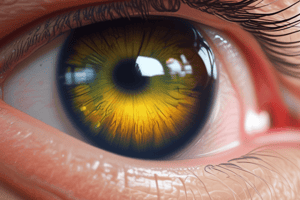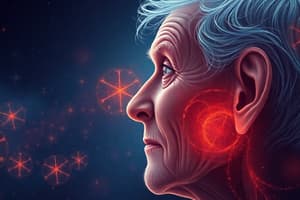Podcast
Questions and Answers
What is the primary definition of presbycusis?
What is the primary definition of presbycusis?
Which of the following factors is NOT a risk associated with presbycusis?
Which of the following factors is NOT a risk associated with presbycusis?
Which type of presbycusis is associated with the atrophy of nerve cells?
Which type of presbycusis is associated with the atrophy of nerve cells?
What is the general prevalence of hearing loss in individuals over the age of 75?
What is the general prevalence of hearing loss in individuals over the age of 75?
Signup and view all the answers
Which of the following is NOT a consequence of diabetes related to presbycusis?
Which of the following is NOT a consequence of diabetes related to presbycusis?
Signup and view all the answers
Which statement best describes the onset of presbycusis?
Which statement best describes the onset of presbycusis?
Signup and view all the answers
What role does chronic middle ear infection play in presbycusis?
What role does chronic middle ear infection play in presbycusis?
Signup and view all the answers
Which factor is associated with diminished perfusion and oxygenation of the cochlea?
Which factor is associated with diminished perfusion and oxygenation of the cochlea?
Signup and view all the answers
What condition results from epithelial atrophy and loss of sensory hair cells in the cochlea?
What condition results from epithelial atrophy and loss of sensory hair cells in the cochlea?
Signup and view all the answers
Which of the following is NOT a reported symptom of sensory presbycusis?
Which of the following is NOT a reported symptom of sensory presbycusis?
Signup and view all the answers
Which test forms the cornerstone of diagnostic testing for presbycusis?
Which test forms the cornerstone of diagnostic testing for presbycusis?
Signup and view all the answers
Patients with presbycusis often find it easier to hear which type of voices?
Patients with presbycusis often find it easier to hear which type of voices?
Signup and view all the answers
What is a common therapeutic intervention for managing presbycusis?
What is a common therapeutic intervention for managing presbycusis?
Signup and view all the answers
What factor is NOT considered when determining treatment for presbycusis?
What factor is NOT considered when determining treatment for presbycusis?
Signup and view all the answers
Which of the following does not represent a recommended way to manage or treat presbycusis?
Which of the following does not represent a recommended way to manage or treat presbycusis?
Signup and view all the answers
What anatomical changes are associated with sensory presbycusis?
What anatomical changes are associated with sensory presbycusis?
Signup and view all the answers
Study Notes
Presbycusis
- Age-related hearing loss in elderly individuals.
- Progressive and symmetrical hearing loss in both ears due to multiple factors.
Risk Factors for Presbycusis
- Aging:
- Arteriosclerosis: Diminished perfusion and oxygenation of the cochlea.
- Diabetes: Accelerates the process of atherosclerosis, interfering with cochlear perfusion.
- Stress
- Genetics
- Environmental Exposure:
- Noise exposure
- Chemicals
- Ototoxic drugs:
- Salicylates
- Loop diuretics
- Cisplatin
- Quinine
- Other Factors:
- Chronic middle ear infections
- Chronic cerumen impaction
Prevalence of Presbycusis
- 1 in 3 adults over 65 years old experience hearing loss.
- Almost half of individuals over 75 years old experience hearing loss.
- Presbycusis occurs gradually and often affects both ears equally.
- Some individuals may not immediately notice the change.
Pathophysiology
- Histologic changes associated with aging occur across the auditory system.
- These changes affect the cochlear hair cells, supporting cells, and the auditory cortex.
- Types of Presbycusis:
- Sensory presbycusis: Epithelial atrophy, loss of sensory hair cells, and supporting cells within the organ of Corti.
- Neural presbycusis: Atrophy of nerve cells in the cochlea and central neural pathways.
- Metabolic (strial) presbycusis: Atrophy of the stria vascularis.
- Mechanical (cochlear conductive) presbycusis: Thickening and stiffening of the basilar membrane in the cochlea.
Clinical Presentation
- Patient Reports:
- Speech sounds mumbled or slurred.
- Difficulty distinguishing high-pitched sounds like "s" or "th".
- Difficulty understanding conversations, especially with background noise.
- Men's voices easier to hear compared to women's voices.
- Some sounds may be overly loud and annoying.
- Tinnitus (ringing in the ears) may occur in one or both ears.
Work-Up of Presbycusis
- Evaluation may include:
- Audiometric testing: Pure-tone average and speech discrimination form the basis of diagnosis.
- Blood tests: To rule out autoimmune-induced hearing loss.
- CT scan or MRI: To exclude anatomical abnormalities or mass lesions causing hearing loss.
- Additional testing: Determined based on the audiometric test results.
- Specific tests:
- Rinne and Weber tests
Treatment of Presbycusis
- Treatment is individualized based on:
- Age
- Severity of hearing loss
- Tolerance for therapies
- Expected course of the disease.
- Treatment options include:
- Avoiding loud noises and reducing noise exposure
- Wearing earplugs or special fluid-filled earmuffs
- Hearing aid(s) referral to an audiologist
- Lip-reading instruction referral
- Assistive devices:
- Telephone amplifiers
- Speech reading training
- Cochlear implants: For some patients with severe presbycusis.
Studying That Suits You
Use AI to generate personalized quizzes and flashcards to suit your learning preferences.
Related Documents
Description
This quiz explores presbycusis, the age-related hearing loss that affects many elderly individuals. It covers risk factors, prevalence, and the underlying pathophysiology contributing to this condition. Test your knowledge on how aging and other factors impact hearing health.




